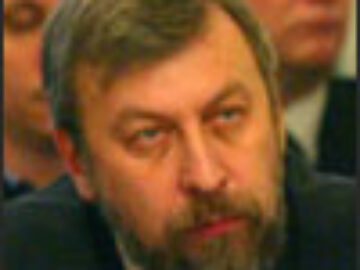Andrei Sannikov: “Belarus takes a back seat in the European history”

“Belarus takes a back seat in the European history, it didn’t understand that neither nuclear Russia nor average by European standards Belarus won’t be able to build relations with the West on their conditions,” Andrei Sannikov, international coordinator of Charter’97 thinks.
The Bucharest conference, organised by the German Marshall Fund of the United States, Ministry of Foreign Affairs of Rumania and British analytical center Chatham House, was held last week. The event was in fact held in the frames of NATO summit and was attended by direct participants of the summit. Eight heads of states, more than 30 ministries of foreign affairs and defence, heads of international organisations, members of national parliaments, representatives of the European Parliament and U.S. Congress, heads of analytical centers, prominent public figures, journalists of the leading world media participated in discussions.
Belarus was represented by Andrei Sannikov, international coordinator of Charter’97, member of the organising committee of the civil campaign “European Belarus,” and Iryna Krasouskaya, head of the foundation “We remember.”
Andrei Sannikov answers the questions of the Charter’97 press center.
– What themes were discussed during the Bucharest Conference?
– In general, it was a rather intensive working summit. It’s naturally that issues of future Ukraine and Georgia joining to NATO were closer to us, but they weren’t the main ones. Programme of NATO participating in restoration of peaceful life in Afghanistan, deployment of U.S. ballistic missile defence elements on the territory of two European states, and creation of European anti-missile system were discussed at the summit at highest level. It was noted, that about 20 per cent of the Europe’s territory is uncovered by American missile defence today. As it is known, questions on three Balkan states – Croatia, Albania and Macedonia joining NATO were also discussed. Macedonia wasn’t yet accepted as a future NATO member due to Greece’s veto.
– How do you appreciate the decision taken towards Ukraine and Georgia?
– What concerns receiving Membership Action Plan (MAP) by Ukraine and Georgia, this question was discussed till the last moment. It’s was very interesting to watch the developments of this issue. In the evening of 2 April the decision was unfavourable for Ukraine and Georgia. But after long discussion in the evening of that day and first half of 3 April a good compromise variant, in our view, was found. Official NATO documents and statements of the Secretary General say clearly both Ukraine and Georgia will be NATO members. Moreover, decision on MAP may be taken yet this year, because heads of states in fact authorised ministries of foreign affairs to consider this matter at their meeting this December. As we were in the center of events, it was very useful for us to learn the discussion on this question.
– Russia of course stood against inviting of Ukraine and Georgia into the Membership Action Plan, isn’t it?
– Russian factor undoubtedly influenced the fact that Ukraine and Georgia didn’t formally received MAP, but this provoked negative reaction of all NATO members, and the Alliance will try to avoid such situations in future. It was the first and the last summit where acting Russia’s president Vladimir Putin took part in, so heads of states wanted to observe balance – to represent a common position from one hand and avoid direct confrontation with Russia from the other hand, though the confrontation was noticed at the Bucharest Conference. Participants put unpleasant questions to Russia’s official representatives, members of the State Duma Konstantin Kosachev and Sergei Markov, estimated negatively Russia’s role in energy security issues, violation of human rights and freedoms in Russia. In spite of tensions in relations between the West and Russia, I think the West used NATO Summit and Sochi Russia-U.S. Summit to progress in strategic directions, such as Afghanistan and strengthening of missile shield in Europe. As far as we know, the U.S. and Russia mentioned some controversies, but agreed to further discussion on ballistic missile defence issues. Russia confirmed it was ready to provide air space for transport to Afghanistan.
– Was Belarusian issue discussed at the Bucharest Conference?
– The Belarusian theme wasn’t raised at the conference, but the question was undoubtedly touched at discussions and during the breaks. The Belarusian situation is well known to everyone, so the discussions in general reduced to a question: what should be done for Belarus’ returning to the family of European peoples. Against the background of the conflict with the U.S. embassy and new groundless demands to cut embassy staff, it was said much about European solidarity with the United States. And not only European. Canadian government is watching closely the events in Belarus.
In general, many politicians and analysts said they were interested in developing ties with Belarus, but a sign they received over the last time made them think about human rights defence, not about economic ties developing. If Belarusian subject was rarely discussed on international conferences before, but now seminars and conferences dedicated to Belarus and our region, including Ukraine and Russia, are often organised in the European courtiers and the U.S.
– Were Russian threats to deploy its missiles in Belarus discussed at the conference?
– It wasn’t discussed. It was a clear clumsy attempt of Russian militarists by tacit agreement of the official Minsk to demonstrate NATO something. It will be another matter if this issue is raised not ahead of some NATO and the United States decisions, but in different situation, then it should be taken seriously.
The conference again demonstrated that even the countries, which are not aspiring for the Alliance joining, establish mutually beneficial relations with the organisation. Belarus takes a back seat in the European history, it doesn’t understand neither nuclear Russia nor average by European standards Belarus won’t be able to build relations with the West on their conditions.
